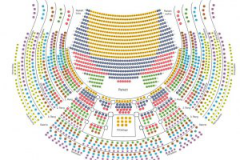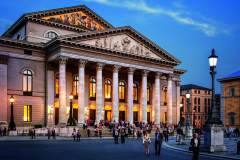The Bartered Bride
Mo | Tu | We | Th | Fr | Sa | Su |
Opera comique in three acts (1866)
In German with German and English surtitles.
Composer Bedrich Smetana. Libretto by Karel Sabina.
recommended for 8 years and older
Seeing his love succeed against the will of the parents is pretty difficult in a rural setting. Especially when he is also considered an outsider, things do not look good with the parents-in-law, and there's a lot of money in the mix as well. But what Hans negotiates with Kezal the marriage broker, without discussing it with his beloved Marie, certainly requires a very special kind of chutzpah, and it very nearly goes all wrong – bartering his loved one to a certain person, which turns out through rhetorical trickery to be himself, only becomes evident as a good idea at the end. Which once again proves: The comedy is only a tragedy avoided at the very last minute.
SYNOPSIS
FIRST ACT
It is spring and the villagers are celebrating heartily at the church fair. Praising the joys of young love, they do, however, warn of the monotony that can appear all too quickly in married life. Marie bemoans to her lover Hans that she, at the behest of her parents, shall be wedded to an unknown man today. Hans attempts to calm her and encourages her to resist her parents’ wishes. Marie feels no better, but swears her love for Hans. She would remain his forever, if only her parents did not force her to wed another man. Hans’ placidity leads Marie to the belief that his love for her is not serious. She asks her lover about his origins and background, and he replies by saying that he is from a prosperous family. After the death of his mother, his father took a new wife and Hans was banished from the court. Hans laments his mother’s passing, and Marie comforts him. The young couple reassure each other of their reciprocal love. Marie’s parents, Kruschina and Kathinka, consult the marriage broker Kezal. He praises his own style of mediation and ensures Marie’s parents of the legitimacy of planning Marie’s wedding without her consent. Kezal reminds Kruschina that years ago he already promised Tobias Micha that his son may marry his daughter. Kathinka scolds her man for agreeing to give away their daughter without her consent. Marie will not back down. While Kruschina and Kezal press for the marriage, Marie reveals her love for Hans. She does not accept the contract signed between Kezal and her father. Kezal suggests that Kruschina meet Tobias Micha so that the two fathers may discuss the situation. Meanwhile, the villagers continue to drink and dance.
SECOND ACT
As the men enjoy their beer, Hans drinks to his happiness. Kezal swears by the value of money. Tobias Micha’s son Wenzel wants to free himself from his mother’s contract and collect his bride Marie, clearly out of his depth. He meets Marie, who recognises him instantly as her chosen groom. She warns him of his future bride, her love for another and how she will torment him to death. She invents a secret admirer for him and entices him to make a secret oath: Wenzel shall renounce Marie as his bride and never go near her again. Kezal attempts to separate Hans from Marie. Once again, the marriage broker praises money as a higher commodity than love and promises Hans another woman with great wealth. Hans resists, but Kezal offers him money to leave Marie free for Tobias Micha’s son. For 300 florins, Hans consents to such a worded contract. Secretly, Hans celebrates: he is now sure he has laid the path for his marriage to Marie. Kezal informs the villagers of the contract between him and Hans. That somebody could sell their bride for money, disgusts them and Kruschina.
THIRD ACT
A travelling circus interrupts the musings of the deathly-saddened Wenzel. The circus manager announces the highlight of the programme: the dancer Esmeralda, an Indian chief, a cannibal and, as the main attraction, a bear from America. However, Muff, the Indian impersonator, informs the manager that the bear impersonator got drunk in a bar and is unable to perform. A replacement cannot be found, as the bear costume fits no one. Then they notice Wenzel, who has the correct size. The circus manager senses his chance and invites Wenzel to join the circus troupe, with the promise that were he to perform as the bear and dance in costume, he would receive Esmeralda as his wife. Wenzel quickly forgets his reservations that he cannot dance, and his mother’s reproaches for such attempts, when Esmeralda makes eyes at him. In contrast to his parents, Agnes and Tobias Micha, Wenzel wishes to know nothing more of his betrothal to Marie. Marie is appalled at hearing of Hans’ alleged betrayal, and Kezal confirms her fears by showing her the contract signed by Hans. Kathinka and Kruschina suggest that their daughter become engaged to Wenzel. He wishes to marry her immediately, as he recognises her as the charming girl who made him renounce his oath. Marie laments her lost happiness with Hans. She wishes to know no more from him and allows him to speak no words when he tries to explain his contract with Kezal. Kezal now finally wants to enact the sale of the bride. Marie is shocked that Hans is in agreement. To everyone’s amazement, Tobias Micha recognises his lost son in the shape of Hans. Hans’ plan begins to bear fruit: the fact he is Tobias Micha’s son means that he has, in fact, not sold Marie to another. Marie must now decide between him and Wenzel, a decision she finds easy. She chooses Hans. The parents of the happy couple laugh at Kezal’s failure, while he bemoans his defeat. Suddenly, there are news about an escaped bear. Wenzel can be recognised under the bear costume, and is ridiculed by everyone and scolded by his mother Agnes through shame. Tobias Micha reconciles himself with his son, and there is now nothing to stand in the way of the marriage between Hans and Marie.
Program and cast
Duration est. 2 hours 50 minutes
Conductor: Tomáš Hanus
Director: David Bösch
Stage Designer: Patrick Bannwart
Costume Designer: Falko Herold
Lighting: Michael Bauer
Chorus: Stellario Fagone
Dramaturge: Rainer KarlitschekLukas Leipfinger
Kruschina: Bálint Szabó
Kathinka: Juliane Banse
Marie: Emily Pogorelc
Micha: Martin Snell
Agnes: Katja Pieweck
Wenzel: Ya-Chung Huang
Hans: Pavol Breslik
Kezal: Martin Winkler
Springer: Kevin Conners
Esmeralda: Erika Baikoff
Muff: Paweł Horodyski
Bayerisches Staatsorchester
Chorus of the Bayerische Staatsoper
National Theatre Munich
The National Theatre Munich (German: Nationaltheater München) is an opera house in Max-Joseph-Platz in Munich, Germany. It is the home of the Bavarian State Opera and the Bayerisches Staatsballett(Bavarian State Ballet).
The Bavarian State Opera also performs in the Prinzregententheater, which opened in 1901 and, like the Bayreuth Festspielhaus, is built to Richard Wagner's specifications, and in the Cuvilliés Theatre at the Residenz, constructed in 1751–1753 and described by Thierry Beauvert as "a Rococo gem".
The Nationaltheater is very easy to get to both by car and by MVV public transportation.
By MVV public transportation
S-Bahn: S 1 - 8 Marienplatz
U-Bahn: U 3, 6 Marienplatz, U 3 - 6 Odeonsplatz
Bus: 52, 131 Marienplatz, 100 Odeonsplatz
Straßenbahn: 19 Nationaltheater
On the day of the performance, holders of regular tickets are entitled to use public transport provided by the Münchner Verkehrsverbund (MVV). This service starts at 3 pm respectively three hours before the performance commences and ends with the closing hour of the MVV.
By Car
Take the Altstadt-Ring to Maximilianstraße.
Parking garage Max-Joseph-Platz: open Monday to Sunday from 6:00 A.M. to 2:00 A.M.
You can take advantage of the special theatre parking fee of Euro 10,- from 6:00 P.M. to 8:00 A.M. by presenting your admission tickets.

 EN
EN DE
DE IT
IT FR
FR ES
ES RU
RU JP
JP RO
RO
 Seating plan
Seating plan 